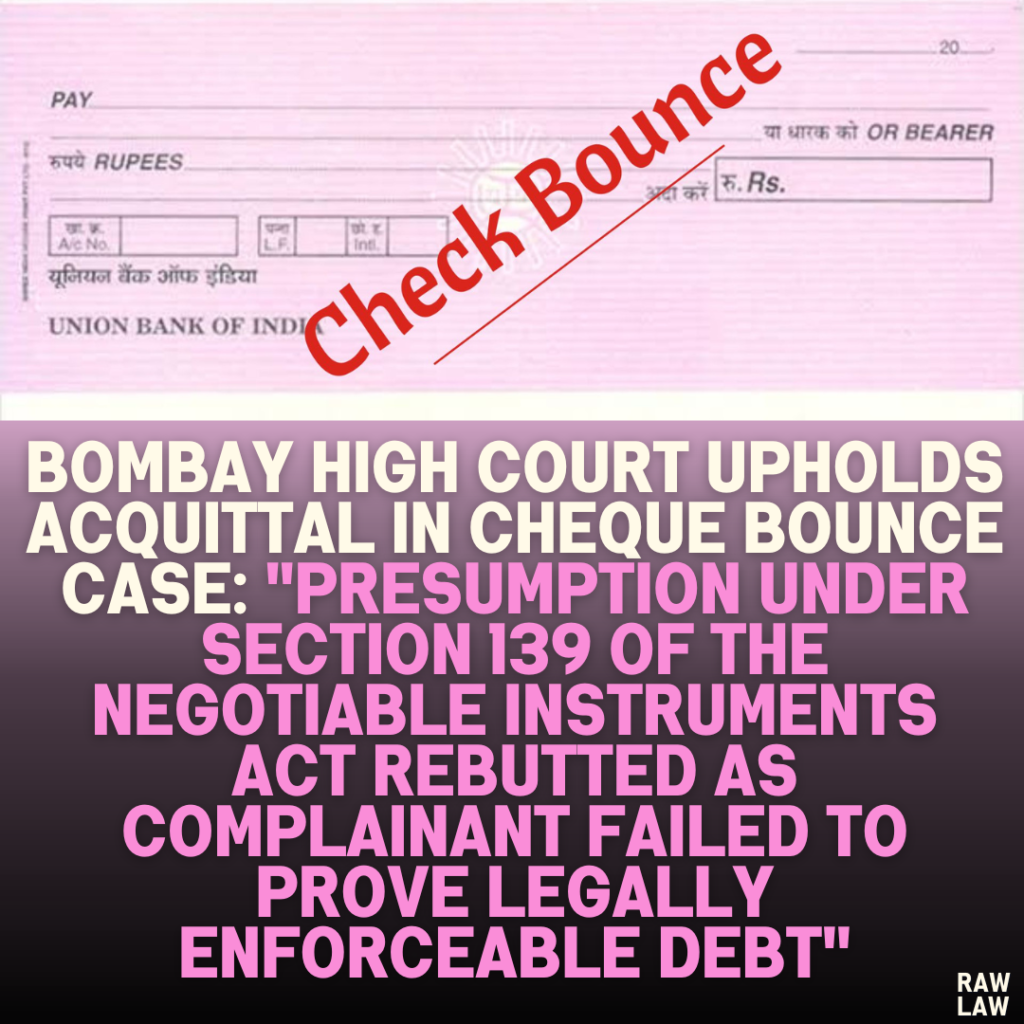Court’s Decision
The Bombay High Court upheld the trial court’s acquittal of the accused in a case under Section 138 of the Negotiable Instruments Act, 1881. The court ruled that the complainant failed to substantiate his claim that the accused issued the cheques in discharge of a legally enforceable debt. It emphasized that the presumption under Section 139 of the Act is rebuttable, and the accused successfully raised a plausible defense.
Facts
- Background of the Case:
- The complainant, a former accountant of the accused’s firm, alleged that the accused owed him ₹49,83,836 under 11 distinct heads, including unpaid salary, brokerage, and repayment of loans arranged for the accused’s business.
- The accused issued two cheques, which were dishonored upon presentation due to insufficient funds.
- Trial Court Proceedings:
- Initially, the trial court convicted the accused, but the conviction was quashed on appeal. The case was remanded for reconsideration to determine whether a legally enforceable debt existed at the time of cheque issuance.
- Upon rehearing, the trial court acquitted the accused, finding the complainant’s evidence insufficient.
- Appeal in the High Court:
- The complainant challenged the acquittal, asserting that the evidence provided, including personal records, oral testimony, and alleged admissions by the accused, established the existence of the debt.
Issues
- Whether the accused issued the dishonored cheques to discharge a legally enforceable debt.
- Whether the complainant provided sufficient evidence to substantiate his claims.
- Whether the trial court’s acquittal was justified under the law.
Petitioner’s Arguments
- Nature of Claims:
- The complainant alleged that the accused owed substantial amounts for unpaid salary, brokerage, interest, and other financial obligations.
- He claimed to have paid several third parties on behalf of the accused, based on mutual trust and without formal documentation.
- Evidence Presented:
- Handwritten personal notebooks (Exhibits P2–P4), computer-generated statements (Exhibit P13), and oral testimony.
- He argued that under Section 139 of the Negotiable Instruments Act, there was a presumption of legal liability in his favor.
- Submissions:
- The complainant argued that the accused’s acknowledgment of issuing the cheques was sufficient to prove the debt.
- He contended that the trial court erred by disregarding his evidence, which should have been sufficient to establish liability.
Respondent’s Arguments
- Denial of Liability:
- The accused claimed the cheques were blank signed cheques misused by the complainant, who had access to them as his accountant.
- He argued there was no legally enforceable debt and that the complainant had fabricated the claims.
- Evidence Against the Complainant:
- The accused highlighted that the complainant failed to produce any agreements or documents signed by the accused to support his claims.
- Cross-examination of the complainant revealed inconsistencies and admissions, including that some claims were based on oral assurances without corroboration.
- Fraud Allegations:
- The accused alleged that the complainant misappropriated funds and acted beyond his authority, particularly by inserting his name as the drawee on blank cheques intended for a third party.
Analysis of the Law
- Section 138 and Section 139 of the Negotiable Instruments Act:
- Section 138 penalizes dishonor of cheques issued in discharge of a legally enforceable debt.
- Section 139 presumes the existence of such debt, but the presumption is rebuttable by the accused.
- Standard of Proof:
- The court reiterated that the accused only needed to establish a plausible defense, not discharge an unduly high burden of proof.
- It noted that mere oral testimony and self-prepared documents were insufficient to prove liability.
- Rebuttable Presumption:
- The court cited precedents, including Rangappa v. Sri Mohan (2010) and Krishna Janardhan Bhat v. Dattatraya G. Hegde (2008), to affirm that once the accused raises a probable defense, the complainant must provide stronger evidence to substantiate the debt.
Precedent Analysis
The court analyzed multiple judgments to clarify the scope of appellate review in acquittal cases. It highlighted the following principles:
- Appellate courts should be cautious in overturning trial court acquittals unless the findings are perverse or against the weight of evidence.
- Presumptions under Section 139 are subject to rebuttal, and courts must evaluate evidence meticulously to determine legal liability.
Court’s Reasoning
- Inadequate Evidence:
- The complainant’s case was primarily based on personal records and oral claims, which were not corroborated by independent evidence or agreements.
- The court found that the handwritten notebooks (Exhibits P2–P4) lacked credibility and did not conclusively establish the alleged debt.
- Fraud Allegations and Cross-Examination:
- The accused’s defense that the cheques were blank and misused by the complainant was plausible and remained unshaken during cross-examination.
- The complainant admitted that some claims included interest and lacked any documentary proof of mutual agreements.
- Scope of Appellate Review:
- The court noted that the trial court’s findings were not perverse or unreasonable. The presumption of innocence, bolstered by acquittal, could not be disturbed without compelling evidence.
Conclusion
The High Court upheld the trial court’s decision, finding that the complainant failed to prove the existence of a legally enforceable debt. It dismissed the appeal and emphasized that mere oral evidence and personal records are insufficient in cases involving financial claims.
Implications
This judgment reinforces the necessity of documentary evidence in financial disputes and clarifies the limits of presumptions under Section 139 of the Negotiable Instruments Act. It highlights the importance of maintaining proper records and agreements in financial dealings to establish enforceable claims.




Pingback: Delhi High Court: Judicial Interference in Academic Matters Limited; Dismisses Challenge to CAT 2024 Answer Key for Lack of Demonstrable Error - Raw Law